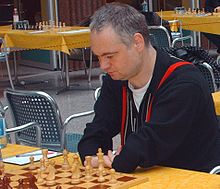In chess, fool's mate is the checkmate delivered after the fewest possible moves from the game's starting position. It arises from the following moves, or similar:
The Modern Defense is a hypermodern chess opening in which Black allows White to occupy the center with pawns on d4 and e4, then proceeds to attack and undermine this "ideal" center without attempting to occupy it. The opening has been most notably used by British grandmasters Nigel Davies and Colin McNab.

The World Chess Championship 1972 was a match for the World Chess Championship between challenger Bobby Fischer of the United States and defending champion Boris Spassky of the Soviet Union. The match took place in the Laugardalshöll arena in Reykjavík, Iceland, and has been dubbed the Match of the Century. Fischer became the first American born in the United States to win the world title, and the second American overall. Fischer's win also ended, for a short time, 24 years of Soviet domination of the World Championship.
The Hippopotamus Defence is a chess opening system employed by Black, consisting of a double fianchetto structure and a small pawn centre. The knights are typically developed to e7 and d7 and the rook's pawns to a6 and h6. This structure can be obtained by a wide variety of move orders but it occurs most frequently via the Modern Defence or Owen's Defence. The Hippopotamus can also be played against queen's pawn openings or flank openings and is thus a genuinely universal system. The same structure is also occasionally utilized by White.
The Torre Attack is a chess opening characterized by the moves:
In chess, the Dragon Variation is one of the main lines of the Sicilian Defence and begins with the moves:

The World Chess Championship 2006 was a match between Classical World Chess Champion Vladimir Kramnik and FIDE World Chess Champion Veselin Topalov. The title of World Chess Champion had been split for 13 years. This match, played between September 23 and October 13, 2006, in Elista, Kalmykia, Russia, was to reunite the two World Chess Champion titles and produce an undisputed World Champion.
In chess, the move 9.Bc4 is one of the main options in the chess opening called the Yugoslav Attack, which is an attack in the Dragon Variation of the Sicilian Defence. Also known as the Rauzer System or the St George Attack, the Yugoslav Attack begins with the following moves:
- e4c5
- Nf3d6
- d4cxd4
- Nxd4Nf6
- Nc3g6
- Be3Bg7
- f30-0
- Qd2Nc6
- Bc4
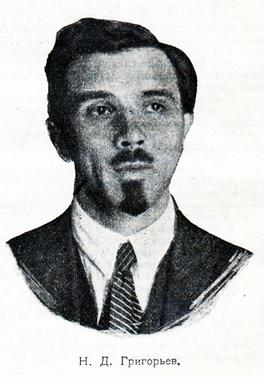
Nikalai (Nikolay) Dmitrievich Grigoriev was a Russian chess player and a composer of endgame studies. He was born on 14 August 1895 in Moscow, and he died there in 1938.

The World Chess Championship 1886 was the first official World Chess Championship match contested by Wilhelm Steinitz and Johannes Zukertort. The match took place in the United States from 11 January to 29 March, the first five games being played in New York City, the next four being played in St. Louis and the final eleven in New Orleans. The winner was the first player to achieve ten wins. Wilhelm Steinitz won the match 10–5, winning his tenth game in the twentieth game of the match. There were five draws.

The World Chess Championship 1889 was the second official World Chess Championship, and was between Wilhelm Steinitz and Mikhail Chigorin. It took place in Havana, Cuba. Steinitz defended his world title, and was the first of the two players to reach 10½. He won the match 10½-6½.

A World Chess Championship was played between challenger Max Euwe and title-holder Alexander Alekhine in various cities and towns in the Netherlands from 3 October to 16 December 1935. Euwe was the winner by overcoming a three-point deficit as late as the ninth game.
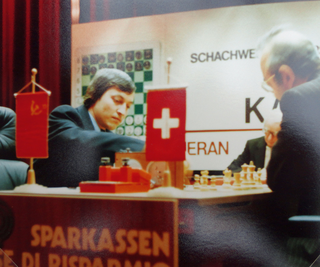
The 1981 World Chess Championship was played between Anatoly Karpov and Viktor Korchnoi in Merano, Italy from October 1 to November 19, 1981. Karpov won with six wins against two, with 10 draws. The two players had already played against each other in the World Chess Championship match 1978 in the Philippines, when Karpov also won.
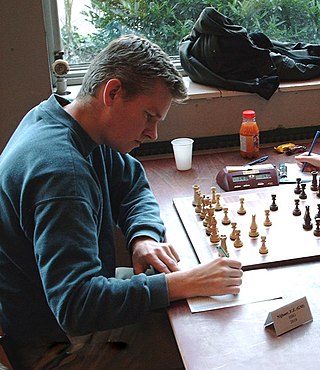
Friso Nijboer is a Dutch chess player. He achieved the title of Grandmaster in 1996.
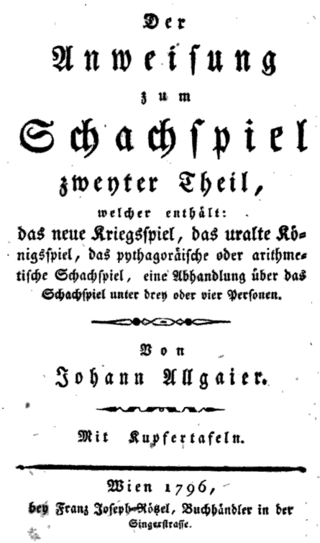
Johann Baptist Allgaier was a German-Austrian chess master and theoretician. He was also the author of the first chess handbook in German – Neue theoretisch-praktische Anweisung zum Schachspiel.

The World Chess Championship 2013 was a match between reigning world champion Viswanathan Anand and challenger Magnus Carlsen, to determine the World Chess Champion. It was held from 7 to 25 November 2013 in Chennai, India, under the auspices of FIDE.

Mikhail Gluzman is a Ukrainian-Australian chess International Master and an experienced chess coach.
The 1992 Fischer–Spassky match between former world chess champions Bobby Fischer and Boris Spassky was billed as a World Chess Championship, though it was an unofficial rematch of their 1972 World Championship match. Fischer won 10–5, with 15 draws.

The World Chess Championship 2016 was a chess match between the reigning world champion Magnus Carlsen and the challenger Sergey Karjakin to determine the World Chess Champion. Carlsen had been world champion since 2013, while Karjakin qualified as challenger by winning the 2016 Candidates Tournament. The best-of-12 match, organized by FIDE and its commercial partner Agon, was played in New York City between 10 and 30 November 2016.

The World Chess Championship 2018 was a match between the reigning world champion since 2013, Magnus Carlsen, and the challenger Fabiano Caruana to determine the World Chess Champion. The 12-game match, organised by FIDE and its commercial partner Agon, was played at The College in Holborn, London, between 9 and 28 November 2018. The games were broadcast on worldchess.com and by NRK.
